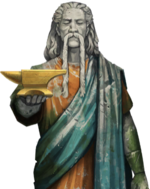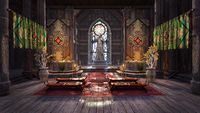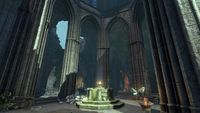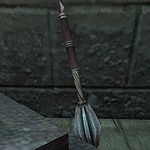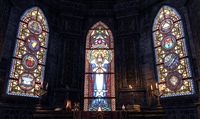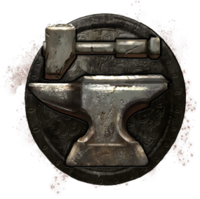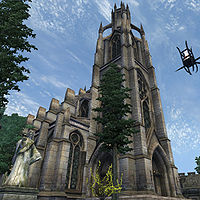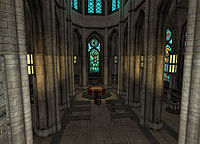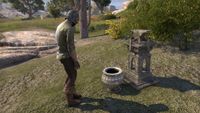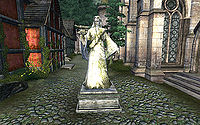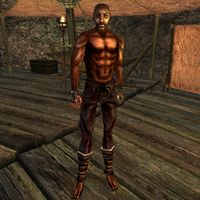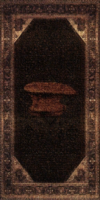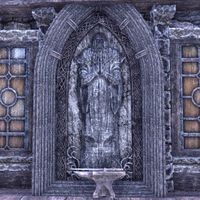Lore:Zenithar
Zenithar, the God of Work and Commerce, the Provider of our Ease,[1] is one of the Divines.[2][3][4] The Trader God is frequently seen as the same deity as the Bosmeri god Z'en.[5] In the Empire, however, Zenithar is considered a more cultivated god of merchants and middle nobility, being the deity of wealth, labor, commerce, communication,[5][6] and community.[UOL 1]
He has strong ties to Cyrodiil and High Rock.[5] The introduction of the worship of Zenithar was largely tolerated in Hammerfell due to his similarities to a Yokudan agricultural deity.[7] His worshippers say that, despite his mysterious origins, Zenithar is the god 'that will always win'.[5] His priests teach that the path to peace and prosperity is through earnest work and honest profit, not through war, bloodshed, or theft.[8] Zenithar is seen as a warrior god, but one who is restrained and reserved in times of peace.[9][10]
He is thought to be associated with Kynareth,[11] as well as a large blue star sometimes seen in the skies of Tamriel.[12] It's also said that he is most in touch with the mortal world, and that he created the Mace of the Crusader for Pelinal Whitestrake to help him defeat Umaril the Unfeathered.[13]
Zenithar appeared to the Nerevarine during their service to the Imperial Cult, as a Redguard named Jon Hawker, and after he had been freed, the Nerevarine received his gauntlets, Zenithar's Warning and Zenithar's Wiles.[14]
Worship[edit]
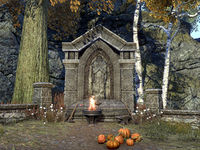
Temples devoted to him are sometimes called Resolutions. Worship of Zenithar is typically more prevalent in some geographic areas, such as Leyawiin, Totambu, and Kambria.[3]
A blacksmith's anvil is his symbol, representing labor and production. The Daggerfall Merchant's Guild is known to award small golden anvils in Zenithar's name to upstanding members.[15] Worshippers of Zenithar often keep small devotional anvils in their homes and pewter scale weights engraved with a blue star in the coin purses for financial luck in trying times.[16][17]
One form of an offering to Zenithar is to burn crops at a shrine of him to offer thanks for prosperity.[18] Worshippers also use special prayer beads to call forth good luck and success in all types of negotiations.[19]
After Imperialization and the loss of independence, some Reachmen embraced the worship of the Eight Divines, including Zenithar, believing that certain aspects of their traditional practices were best left in the past.[20][21][22]
Artifacts[edit]
Golden Anvil[edit]
A holy relic of Zenithar, that was made of unremarkable iron, by a pious smith, Zenithar honored the smiths work by turning the anvil into gold. The anvil would then fall under the care of the priests of Zenithar's Abbey, which later fell into ruins by avarice.[23] The Redguard resolute, Daluion traveled to the ruined Zenithar's Abbey to find the long-lost Golden Anvil and learn the story of the abbey's arbitrator, Gavos Douar. With the help of an adventurer, they were able to bypass the monsters that inhabited the ruin and recover the sigil keys to the adytum on the east side of the abbey.
They found the decrepit and corroded Golden Anvil on the temple's main altar as well as an elderly Gavos Douar, who tried to preserve the anvil for many years. Before Zenithar's faith was forever lost in the abbey and the anvil, Daluion blessed it with the adventurer's toil and it brought holy light back to the Golden Anvil.[24] Shortly after its discovery, Daluion returned to the temple in Leyawiin and informed the Primate of the anvil's location. The Knights of Iron were deployed to recover it and cleanse the abbey.[23]
Mace of the Crusader[edit]
The Mace of the Crusader (also known as the Mace of Zenithar) was created by Zenithar. Those it strikes are burnt by holy flames, and it has the ability to turn the undead. According to legend, when Pelinal Whitestrake was slain, a messenger carried the mace to the settlement of Leyawiin. Centuries later, the master craftsman Saint Kaladas built the Great Chapel of Zenithar to honor the legend. When Kaladas died and was entombed in the Chapel, those who prayed to him began to receive visions of the mace. In the vision, the mace can be seen in the distance, separated by a void. The void symbolizes doubt, and an inscription on the tomb says to "walk in the faith". Sir Ralvas of the original Knights attempted hundreds of times to reach the mace, but failed each time. The pilgrim later discovered that the Boots of the Crusader are needed to cross the void; Zenithar has close ties to Kynareth, as craftsmen need to take resources from the natural world. With the boots, the path of faith was illuminated, and the pilgrim recovered the mace.[25]
Zenithar's Blessed Awl[edit]
Zenithar's Blessed Awl is a tool for weavers of thread, reed, and wood. Believers in the god of commerce Zenithar claim that "through the awl, all designs are made possible, threads hold strong, and work progresses easily."
Zenithar's Warning and Zenithar's Wiles[edit]
Zenithar's Warning and Zenithar's Wiles are a set of gloves associated with the God of Commerce Zenithar. They were imbued with magical properties and effects such as reducing an adversary's ability and willingness to fight, and increasing people's disposition towards the wearer.
Planet[edit]
The planet Zenithar is one of the planets found in the skies of Mundus. Mara is Zenithar's satellite and is orbiting around it. The planet is simultaneously Zenithar and the plane of Zenithar, just like the other planets and their eponymous deities.
Gallery[edit]
See Also[edit]
Books[edit]
- Mysteries of the Divines — An excerpt regarding the teachings of Zenithar
References[edit]
- ^ Fortune's Anvil Face Markings collectible description in ESO
- ^ For my Gods and Emperor — Imperial Cult
- ^ a b Charwich-Koniinge, Volume 1 — Charwich
- ^ Pocket Guide to the Empire, 1st Edition: Invocation — Imperial Geographical Society, 2E 864
- ^ a b c d Varieties of Faith... — Brother Mikhael Karkuxor of the Imperial College
- ^ Guide to Cheydinhal — Alessia Ottus
- ^ Pocket Guide to the Empire, 1st Edition: Hammerfell — Imperial Geographical Society, 2E 864
- ^ Ten Commands: Nine Divines
- ^ Events of Daggerfall.
- ^ King Edward, Part X — Anonymous
- ^ Sir Ralvas' dialogue in Knights of the Nine
- ^ King Edward, Part VIII — Anonymous
- ^ Events of Oblivion.
- ^ Ring in Darkness quest in Morrowind
- ^ Golden Anvil of Zenithar
- ^ Zenithar Wood Sculpture item description in ESO
- ^ Zenithar's Measure item description in ESO
- ^ Offerings to Zenithar quest in ESO
- ^ Zenithar Negotiation Beads item description in ESO
- ^ Belchimac's dialogue in Skyrim
- ^ Cedran's dialogue in Skyrim
- ^ Degaine's dialogue in Skyrim
- ^ a b Daluion's dialogue in ESO: Blackwood
- ^ The Golden Anvil quest in ESO: Blackwood
- ^ The Path of the Righteous quest in Knights of the Nine
Note: The following references are considered to be unofficial sources. They are included to round off this article and may not be authoritative or conclusive.
|
||||||||||||||||||||||||||
|
|||||||||||||||||||||||
|
||||||||||||||||||||||||||||||
|
||||||||||||||||||||||||||||||||||
